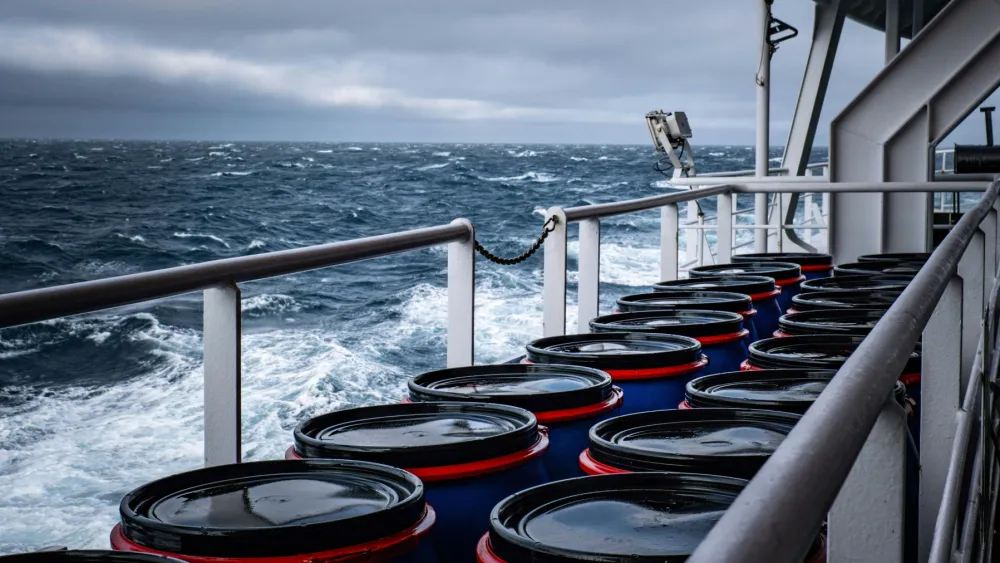
Sustainable fuels not a silver bullet for shipping decarbonisation – experts
The shipping industry can only achieve a 2.8% emission reduction, even if it uses 54% of the world’s renewable energy.
Let’s bring the big question to fore: Are sustainable fuels the answer to decarbonisation in the shipping industry? Maritime experts question their viability as a solution.
Whilst biofuels, ammonia, and methanol provide a more environmentally-friendly alternative for the shipping industry, their lower energy density means that ships will need to use these green options in greater volumes to achieve the same power output that traditional fuels offer.
In figures, this means that if the shipping industry needs 450 million tonnes of ammonia, production of green hydrogen will need to exceed current global production by 200 times.
“The process would use the equivalent of 54% of global renewable energy produced in 2021,” said Katharina Stanzel, managing director of the International Association of Independent Tanker Owners (INTERTANKO), when she addressed the 3rd World Maritime Merchants Forum (WMMF) in Hong Kong.
“Now, it is doubtful… to suggest that 54% of the global total production of renewable energy should be used just to reduce 2.8% of the global gas emissions that are produced by shipping, especially when that energy could be used to make much more significant reductions in other sectors. Sectors that, in any case, are going to compete with shipping for the limited amounts of sustainable fuel economy,” Stanzel added.
The 3rd WMMF was conducted as part of Hong Kong’s Maritime Week celebration from 19 to 25 November.
In the same forum, David Loosley, secretary general and CEO of The Baltic and International Maritime Council (BIMCO), underscored the need for shippers to focus on “certainties” amidst the “many unknowns” and do things that can make a difference right now like optimising one’s fleet.

“What we can do and deal with now is optimising our fleet. To take an example, the Blue Visby Consortium has developed a solution that alone has the potential to reduce greenhouse gas emissions from ships by about 15%,” said Loosley.
The solution is to optimise ships’ arrival times at their destinations by reducing the practice of “Sail Fast then Wait.” “The 15% cut in emissions is not insignificant, but more importantly it can be done,” Loosley said.
Apart from this solution, BIMCO — the world’s largest direct-membership organisation for shipowners, charterers, shipbrokers and agents — is also looking into how it can align its mission and obligations to the business practices of cargo owners using their shipping services.
The trade organisation has also set up its own standards and innovation and research department to help facilitate the optimisation, digitalisation and smarter ways of operating the shipping industry.
Collaboration
The global maritime transport chain’s path to decarbonisation, however, is not up to shipowners alone, said Loosley and Stanzel, underscoring the need for collaboration.
Stanzel said decarbonisation is “dependent on the commitment of others to research and develop, mandate, regulate and adjust expectations.”
There’s also a need to ensure that all stakeholders in the global maritime transport chain, including those who are not directly regulated, are actively engaged in the transition.
Loosley, for his part, stressed the need for an “economic instrument, a balancing mechanism” that can “facilitate the level playing field between the ships to make the transformation.”
Identifying the best fuel
For companies whose top priority remains to be the adoption of sustainable fuels, Zhang Shuang, professor at the Shipping Development Research Institute of Dalian Maritime University, said there are three groups of fuels which shipowners can choose from.
The first group consists of biofuels, whose biggest benefit is that “it is not expensive and is available.”
The other group of alternative fuels are those with carbon in its composition like methanol. “The technology for the uptake of this group of fuels is relatively mature, but the GHG reduction potential heavily depends on the carbon source of this kind of fuel,” Zhang said.
The last group of alternative fuels are those without carbon in this composition like hydrogen and fuels based on hydrogen like ammonia.
For existing ships, Zhang said the straightforward choice would be biofuels.
For new ships, Zhang said methanol can be a practical choice. However, the availability and price of real sustainable methanol in the long run may bring high uncertainty for shipowners.



















 Advertise
Advertise










